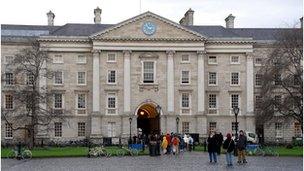Rise in UK applications to Irish universities
- Published

There has been a significant rise in the number of UK students opting to study in Irish universities
The number of UK students who have applied to study at universities in the Republic of Ireland has risen by 28%, according to preliminary figures.
The Republic's Central Applications Office (CAO) confirmed 2,455 students from the UK have applied so far this year, compared with 1,923 last year.
The increase comes as UK students face tuition fees of up to £9,000 per year at some universities in England.
In the Republic, fees are much lower, at 2,250 euros (£1,810) per year.
Free fees
That sum is a college registration fee as opposed to a tuition fee and is officially referred to as the "student contribution".
As regards tuition fees, UK students can qualify for the <link> <caption>Free Fees Initiative</caption> <url href="http://www.studentfinance.ie/mp9377/course-fees/index.html" platform="highweb"/> </link> in Ireland because they are EU citizens, provided that both they and their course meet a number of requirements.
Applicants from Northern Ireland who opt to study in the Republic can do so entirely for free as - in addition to qualifying for free tuition fees as EU citizens - their student contribution fee is paid for by Stormont's Department For Employment and Learning (DEL).
A spokesman for DEL said: "Eligible Northern Ireland domiciled students studying in the Republic of Ireland benefit from special student support arrangements, in that the cost of their registration fee is currently met in full by the department."
He also confirmed that they are eligible to apply through Student Finance NI for a maintenance loan.
The incentive to study in the Republic of Ireland is attractive, as students from Northern Ireland who opt to study at home are facing tuition fees of up to £3,465 per year from September.
According to CAO, there has been a 30% increase in the number of students with addresses in Northern Ireland who have applied to third level institutions in the Republic of Ireland.
The figure is up from 882 in 2011 to 1,148 so far this year.
Passport anomaly
The special arrangement increases the options for many prospective students from Northern Ireland.
Earlier this month it was revealed that sixth form pupils in the UK who hold Irish passports <link> <caption>qualify for free university tuition in Scotland</caption> <url href="http://www.bbc.co.uk/news/uk-northern-ireland-17900220" platform="highweb"/> </link> .
The anomaly means that they are counted as EU students, while UK students from outside Scotland who hold British passports have to pay.
A spokeswoman for the Irish Department for Education said it usually worked out much cheaper to study in the Republic than in the UK.
In addition to lower annual fees, Irish colleges have the discretion to waive the 2,250 euros student contribution altogether, in extenuating circumstances.
The spokeswoman pointed out that currently, 41% of students attending Irish universities who are in receipt of some form of means-tested maintanence grant do not pay the student contribution.
In Northern Ireland, students are eligible to apply for a means-tested higher education bursary of up to £2,000 if their gross household income is less than £23,605.
The DEL spokesman confirmed that the bursary is also available to NI students who secure a place at a university in the Republic.
Offers
The number of UK applications to Dublin's Trinity College - the Republic of Ireland highest-ranked university - has increased by 18% this year.
A spokewoman for Trinity attributed the additional 259 UK applications directly to tuition fee changes which had "resulted in more students from Northern Ireland and the UK considering Irish universities as an option when making their applications".
The preliminary CAO application figures were collated up to 1 February 2012.
The CAO deals with all full-time applications to universities, colleges and third-level educational institutions in the Republic of Ireland.
A CAO spokeman could not provide a figure on the total number of places available in third level education in Ireland, as this varies on a yearly basis depending on the offers made by institutions.
However he said the CAO processed a total of 45,766 successful applications in 2011.
- Published1 May 2012
- Published30 January 2012
- Published8 September 2011